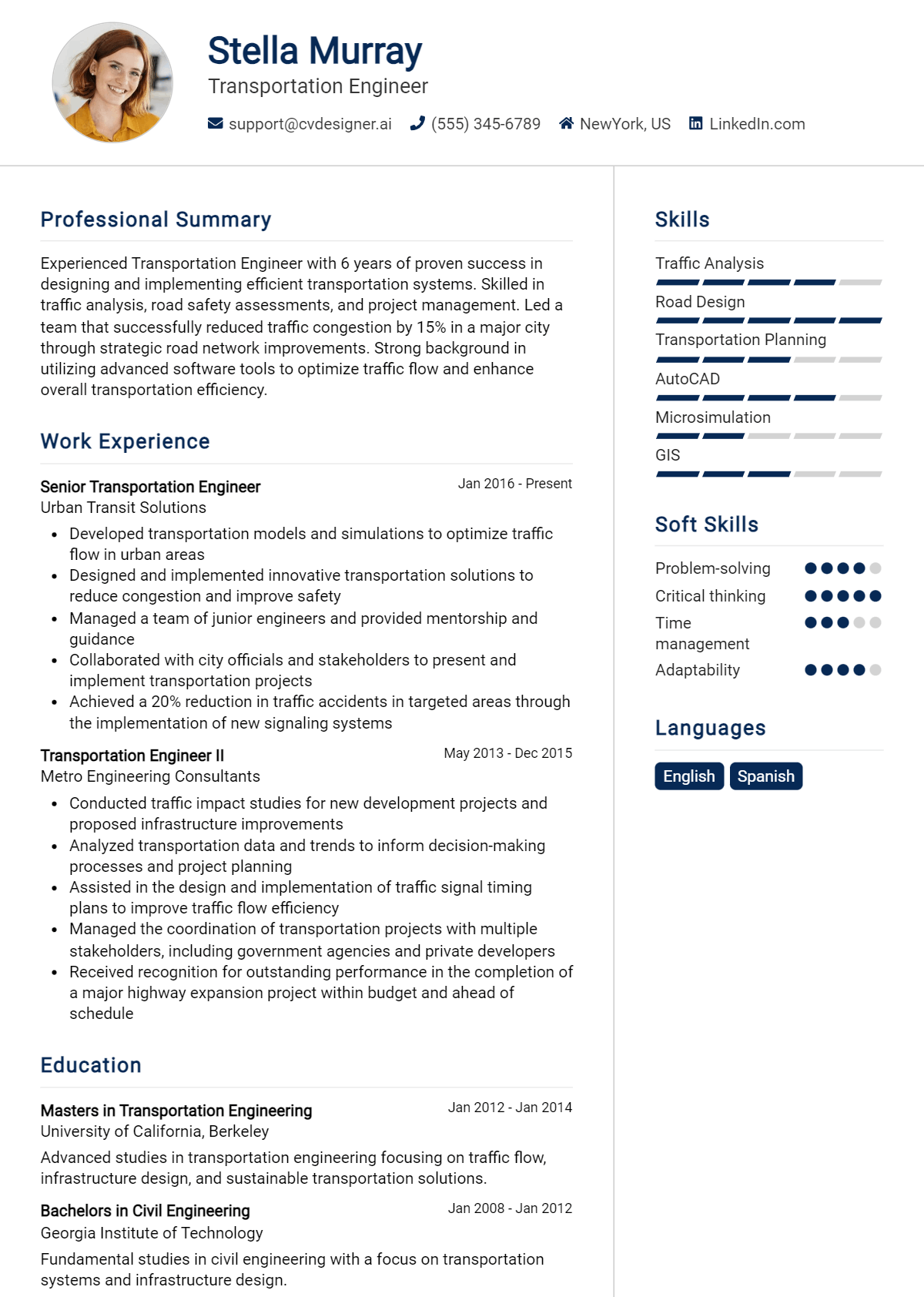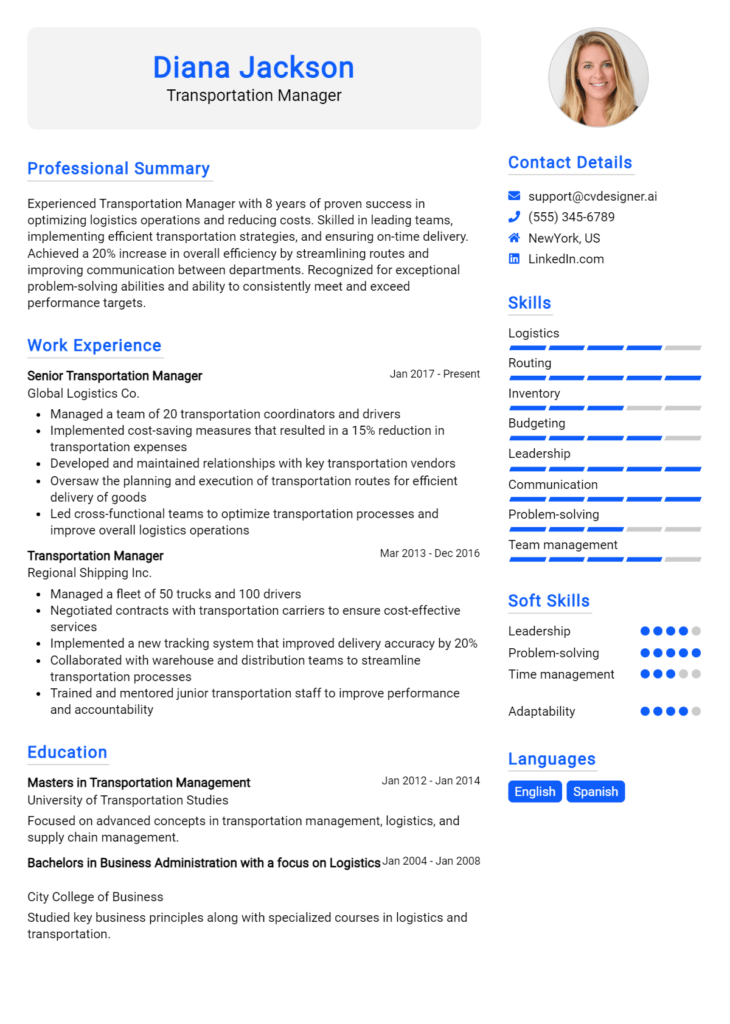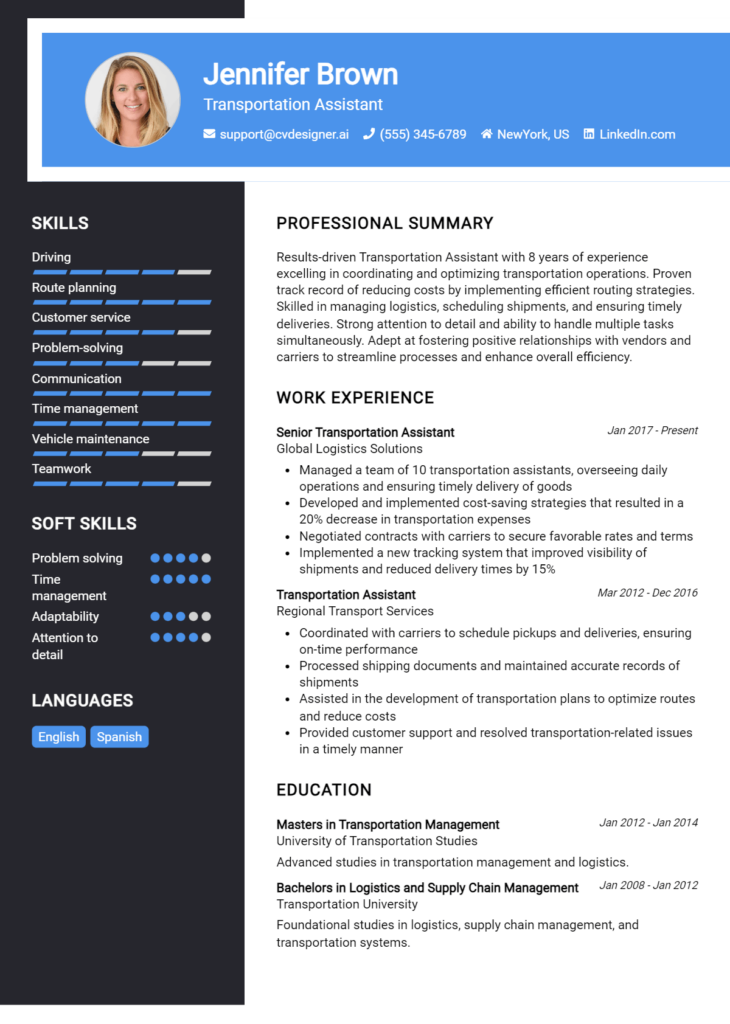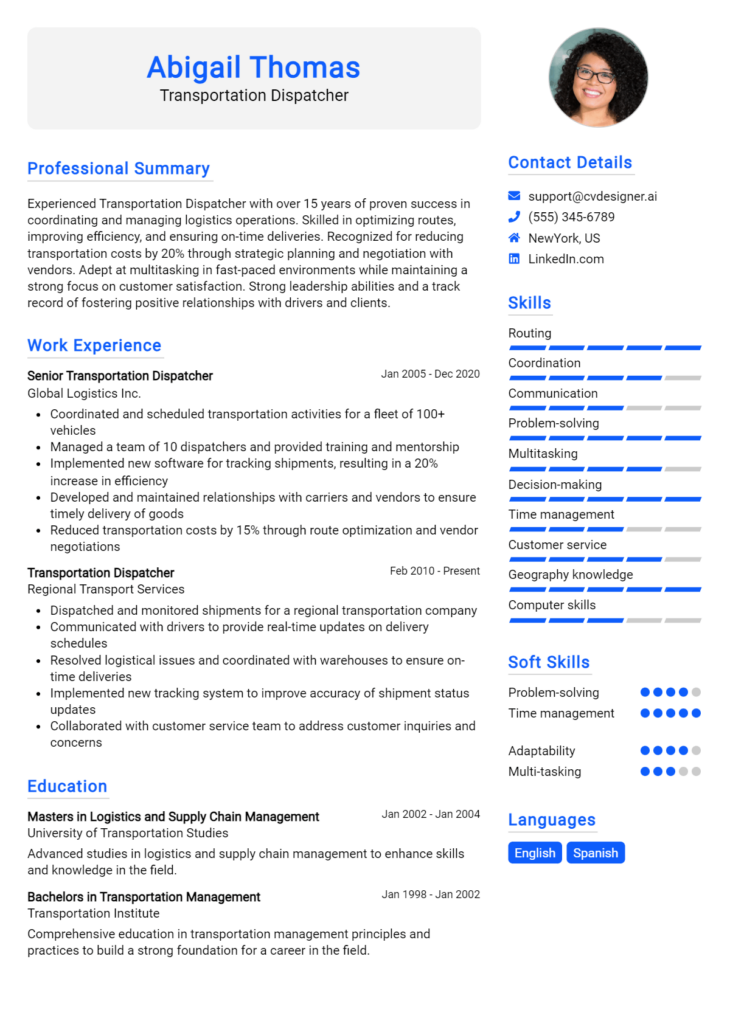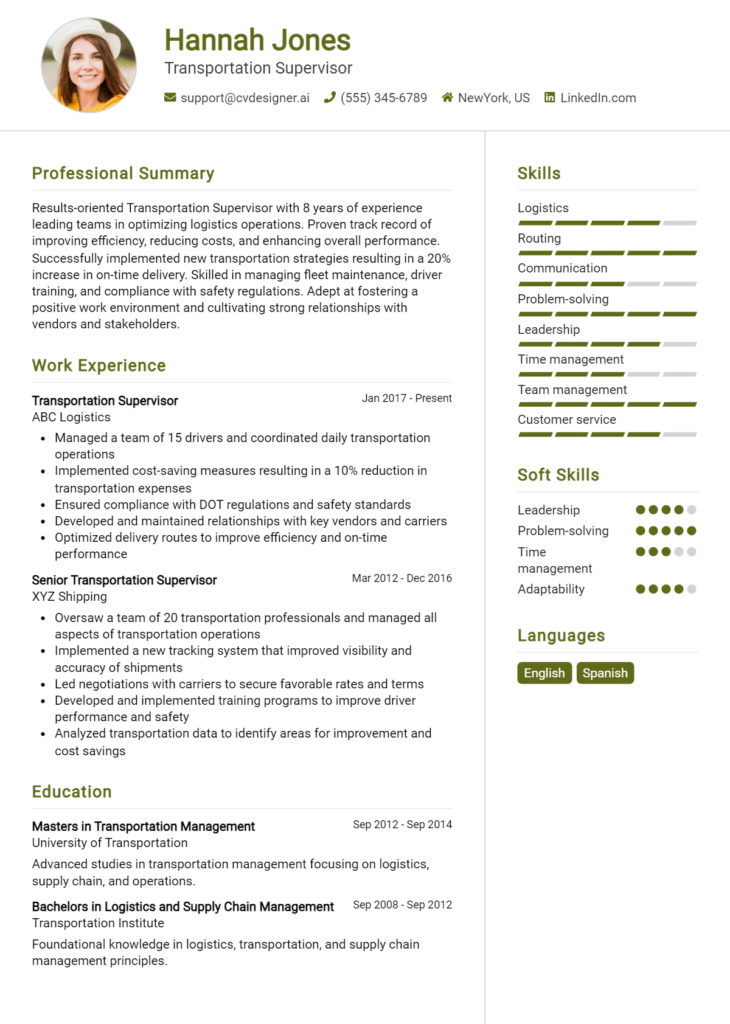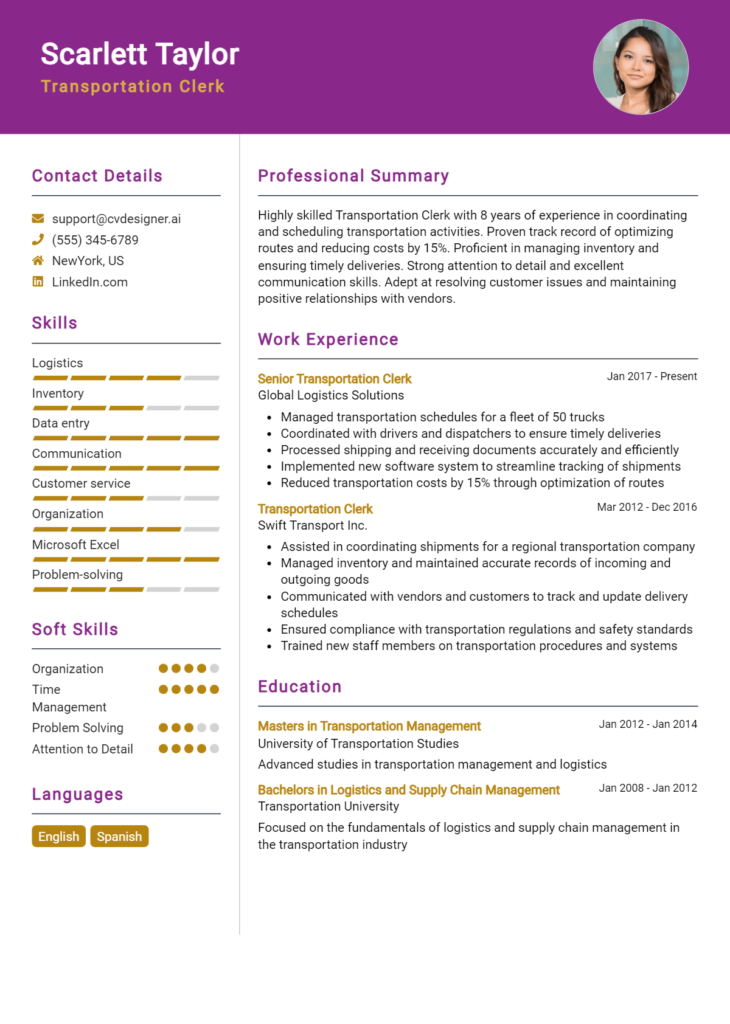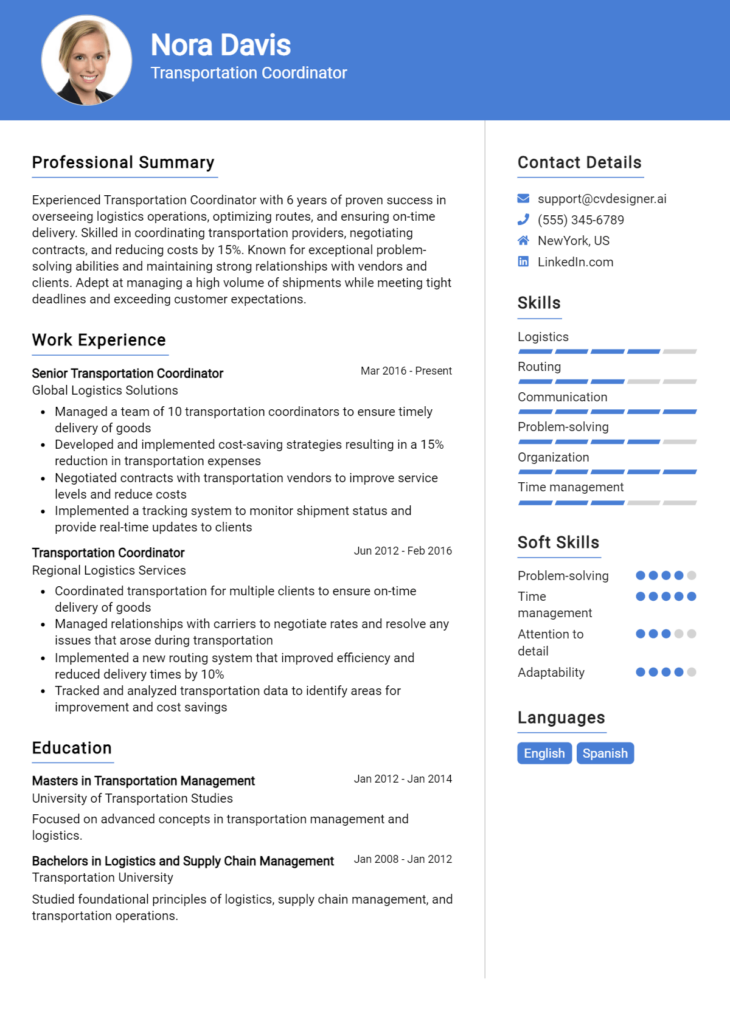Most Popular Transportation Engineer Resume Examples
Explore additional Transportation Engineer resume samples and guides and see what works for your level of experience or role.
As the backbone of our modern infrastructure, Transportation Engineers play a crucial role in designing, developing, and maintaining efficient transportation systems that facilitate the movement of people and goods. Their expertise not only helps to reduce traffic congestion and improve safety but also contributes significantly to sustainable urban development and environmental conservation. Given the highly specialized nature of this profession, a well-crafted resume is essential to showcase your unique skills and experiences effectively. It serves as your first impression to potential employers, making it imperative that it captures your qualifications and aligns with industry standards.
In this comprehensive guide to Transportation Engineer resume writing, we will cover the key responsibilities and vital skills required in this field, ensuring you understand what to highlight in your application. We'll discuss the best resume formats to adopt, common mistakes to avoid that can hinder your chances of landing an interview, and provide resume examples tailored for all experience levels. Additionally, you will find valuable tips on effective resume writing techniques and guidance on selecting the right resume templates that not only look professional but also resonate with hiring managers. Whether you are an entry-level engineer or a seasoned professional, this guide is designed to equip you with the tools needed to create a standout resume.
Key Responsibilities and Skills for a Transportation Engineer
Transportation Engineers play a vital role in designing, developing, and maintaining transportation systems and infrastructure. Their primary responsibilities include:
- Planning and Design: Develop transportation plans and design roadways, bridges, and transit systems to improve safety and efficiency.
- Traffic Engineering: Analyze traffic patterns, conduct traffic studies, and propose solutions to reduce congestion and enhance mobility.
- Project Management: Oversee transportation projects from conception to completion, ensuring they meet regulatory standards and are completed on time and within budget.
- Safety Assessments: Evaluate existing transportation systems for safety and recommend improvements to reduce accidents and enhance public safety.
- Collaboration: Work with government agencies, urban planners, and other engineers to ensure integrated transportation solutions.
- Data Analysis: Utilize data analysis tools and software to assess transportation needs and project impacts on the community.
- Sustainability Initiatives: Incorporate sustainable practices into transportation planning, such as promoting public transit and non-motorized transport options.
To effectively showcase your qualifications for a Transportation Engineer role, it's crucial to highlight the following essential skills in your resume:
- Strong analytical and problem-solving abilities
- Proficiency in engineering software (e.g., AutoCAD, GIS)
- Knowledge of traffic modeling and simulation tools
- Excellent communication and interpersonal skills
- Project management expertise
- Understanding of environmental regulations and sustainability practices
- Attention to detail and strong organizational skills
When crafting your resume, make sure to tailor these responsibilities and skills to align with the specific job description. Highlighting your relevant experience and skills not only enhances your resume but also increases your chances of standing out to potential employers. Additionally, consider how these skills could be integrated into a strong CV, demonstrating your comprehensive understanding of transportation engineering and your suitability for the role.
Best Resume Format and Structure for a Transportation Engineer
When crafting a resume for a Transportation Engineer position, it is essential to choose a format that presents your qualifications clearly and effectively. Here’s a detailed guide on the best resume format and structure for a Transportation Engineer, including key sections and tips for each.
Contact Information
Place your contact information at the top of the resume. This section should include:
- Full name
- Phone number
- Professional email address
- LinkedIn profile URL (optional)
- Location (city and state)
Professional Summary
Following your contact information, include a professional summary. This is a brief statement (2-4 sentences) that highlights your experience, skills, and professional goals. Tailor this section to reflect your expertise in transportation engineering, showcasing your most relevant achievements and qualifications.
Work Experience
This section should detail your employment history, starting with the most recent position and working backward. For each role, include:
- Job title
- Company name and location
- Dates of employment (month and year)
- Bullet points detailing your responsibilities and achievements. Focus on quantifiable results (e.g., reduced project delivery time by 20%, managed budgets of $500,000, etc.) and relevant technical skills (e.g., CAD software, traffic modeling).
Education
List your educational background in reverse chronological order. Include:
- Degree obtained (e.g., Bachelor of Science in Civil Engineering)
- University name and location
- Graduation year (or expected graduation year if you're still studying)
- Relevant coursework or projects (optional), especially if they pertain to transportation engineering.
Skills
Create a section to showcase your technical and soft skills relevant to transportation engineering. You may want to organize these into categories:
- Technical Skills: (e.g., AutoCAD, GIS, traffic simulation software)
- Soft Skills: (e.g., project management, communication, problem-solving)
Certifications
If you hold any certifications relevant to the field, such as Professional Engineer (PE) licensure or certifications in traffic engineering, list them in this section. Include the name of the certification, the issuing organization, and the date obtained.
Additional Sections (optional)
Depending on your experience, consider adding sections such as:
- Projects: Highlight key projects you’ve worked on, including your role and contributions.
- Professional Affiliations: Membership in organizations like the American Society of Civil Engineers (ASCE) can be beneficial.
- Publications or Conferences: If applicable, list any relevant publications or conferences you've spoken at.
Formatting Tips
- Choose a clean, professional layout with clear headings and consistent font styles. Use bullet points for easy readability.
- Keep your resume to one page if you have less than 10 years of experience; two pages may be acceptable for more seasoned professionals.
- Use action verbs to start your bullet points (e.g., "Designed," "Implemented," "Managed").
- Avoid using personal pronouns; keep the language formal and concise.
The format you choose for your resume can complement your corresponding cover letter format. Ensure that both documents maintain a consistent style and tone. A well-structured cover letter should expand on the points made in your resume and provide a narrative about your career, expressing your enthusiasm for the role and the company. Consistency in formatting (fonts, colors, and layout) between the resume and cover letter will present a unified and professional image to potential employers.
Writing Tips and Best Practices for a Transportation Engineer Resume
Crafting a compelling resume as a Transportation Engineer requires a strategic approach to highlight your technical skills, project management experience, and achievements in the field. Start by ensuring your resume is well-organized, easy to read, and free of errors. Pay attention to formatting and use a professional font to create a polished look. Remember, your resume should not only showcase your qualifications but also demonstrate how you can add value to potential employers. Utilize resume writing tips to enhance your document's overall appearance and effectiveness. Additionally, consider applying these best practices when writing your cover letter.
- Use strong action verbs such as "designed," "implemented," or "analyzed" to convey your contributions effectively.
- Quantify your achievements wherever possible, such as "improved traffic flow by 30% through strategic planning."
- Incorporate industry-specific keywords relevant to transportation engineering, such as "traffic modeling," "sustainability," and "infrastructure development."
- Tailor your resume to the specific job description to ensure alignment with the employer's needs and expectations.
- Include relevant certifications, licenses, and software proficiencies that enhance your qualifications, like PE (Professional Engineer) license or familiarity with AutoCAD.
- Highlight collaborative projects and teamwork experiences, as transportation engineering often requires working closely with other professionals.
- Keep your resume concise, ideally one page, focusing on the most relevant experiences and skills.
- Use bullet points for easy readability and to emphasize key information, making it quick for hiring managers to scan your qualifications.
Common Mistakes to Avoid in a Transportation Engineer Resume
Crafting a compelling resume is crucial for Transportation Engineers, as it serves as a first impression to potential employers. However, several common pitfalls can detract from the effectiveness of a resume, ultimately hindering job prospects. It's essential to present your qualifications clearly and concisely, showcasing your expertise without overwhelming the reader. Here are some common mistakes to avoid in your Transportation Engineer resume:
- Overloading the resume with excessive information, making it difficult to read.
- Using generic descriptions that fail to highlight specific skills and achievements.
- Neglecting to tailor the resume for the specific position or company.
- Failing to quantify accomplishments with measurable results, such as project costs or timelines.
- Using jargon or technical terms that may not be understood by all potential employers.
- Ignoring formatting consistency, which can make the document appear unprofessional.
- Listing duties without detailing the impact of your work or outcomes achieved.
- Omitting relevant keywords that align with the job description, which can affect Applicant Tracking Systems (ATS).
- Including outdated or irrelevant experience that does not pertain to the role.
- Not proofreading for grammatical errors or typos, which can undermine your attention to detail.
To ensure your resume stands out positively, consider reviewing the common mistakes to avoid in a resume and also pay attention to essential elements in your cover letter by avoiding common cover letter mistakes. This holistic approach will enhance your chances of landing that desired Transportation Engineer position.
Sample Transportation Engineer Resumes
As a Transportation Engineer, crafting a strong resume is essential to showcase your skills, experience, and qualifications effectively. Below are three sample resumes tailored for different career stages—one for an experienced professional, one for an entry-level candidate, and one for a career changer. These examples highlight the varying backgrounds and competencies within the field, providing a solid foundation for your own resume. For more inspiration, be sure to check out additional resume templates and consider complementary cover letter examples to enhance your job application package.
Experienced Transportation Engineer Resume
John Smith
123 Main Street, Anytown, USA 12345
(123) 456-7890
john.smith@email.com
Summary
Results-driven Transportation Engineer with over 10 years of experience in highway design, traffic engineering, and transportation planning. Proven ability to lead multi-disciplinary teams and manage complex projects from conception to completion. Strong analytical skills with a focus on optimizing transportation systems for safety and efficiency.
Professional Experience
Senior Transportation Engineer
XYZ Engineering Firm, Anytown, USA
January 2018 – Present
- Led a team of engineers in the design and implementation of a $5M highway expansion project, resulting in a 30% reduction in traffic congestion.
- Conducted traffic studies and simulations to improve roadway safety and reduce accident rates by 15%.
- Collaborated with local government agencies to develop transportation plans that align with community needs and sustainability goals.
Transportation Engineer
ABC Consulting, Anytown, USA
June 2012 – December 2017
- Designed intersection improvements that enhanced vehicular and pedestrian safety, receiving commendations from state officials.
- Utilized advanced traffic modeling software to assess and forecast traffic patterns, contributing to informed decision-making.
- Spearheaded public outreach programs to engage community stakeholders in transportation planning processes.
Education
Master of Science in Civil Engineering
University of Anytown, Anytown, USA
Graduated May 2012
Bachelor of Science in Civil Engineering
University of Anytown, Anytown, USA
Graduated May 2010
Certifications
- Professional Engineer (PE), State of Anytown
- Certified Traffic Operations Engineer (CTOE)
Entry-Level Transportation Engineer Resume
Emily Johnson
456 Elm Street, Anytown, USA 12345
(987) 654-3210
emily.johnson@email.com
Summary
Recent Civil Engineering graduate with a focus on transportation engineering and a passion for sustainable infrastructure. Eager to apply academic knowledge and internship experience to contribute to innovative transportation solutions. Strong analytical and problem-solving skills with a commitment to continuous learning.
Education
Bachelor of Science in Civil Engineering
University of Anytown, Anytown, USA
Graduated May 2023
Internship Experience
Transportation Engineering Intern
City of Anytown Department of Transportation, Anytown, USA
May 2022 – August 2022
- Assisted in conducting traffic counts and analyzing data to inform urban planning initiatives.
- Collaborated with senior engineers on the development of a bike lane project, enhancing community accessibility.
- Participated in public meetings and prepared presentations to communicate project updates to stakeholders.
Projects
- Senior Design Project: Developed a comprehensive traffic management plan for a local intersection, focusing on safety and efficiency.
Skills
- Proficient in AutoCAD, HCS, and Synchro
- Strong understanding of traffic engineering principles and modeling techniques
- Excellent communication and teamwork abilities
Career Changer Transportation Engineer Resume
Michael Brown
789 Pine Street, Anytown, USA 12345
(555) 123-4567
michael.brown@email.com
Summary
Dynamic professional transitioning to Transportation Engineering from a background in urban planning. Extensive experience in project management, stakeholder engagement, and data analysis. Committed to leveraging diverse skills to enhance transportation systems and promote sustainable development.
Professional Experience
Urban Planner
DEF Urban Planning Group, Anytown, USA
June 2015 – Present
- Managed community development projects, focusing on transportation infrastructure improvements to facilitate urban growth.
- Conducted feasibility studies and site analyses to assess potential impacts on traffic patterns and public transit accessibility.
- Engaged with community stakeholders to gather input and ensure project alignment with local needs and goals.
Assistant Project Manager
GHI Construction, Anytown, USA
January 2012 – May 2015
- Assisted in the management of infrastructure projects, including road construction and rehabilitation, ensuring adherence to timelines and budgets.
- Developed project documentation and reports, improving communication between teams and clients.
Education
Bachelor of Arts in Urban Studies
University of Anytown, Anytown, USA
Graduated May 2011
Certifications
- Certified Planner (AICP)
- Project Management Professional (PMP) (in progress)
Skills
- Strong analytical and data interpretation skills
- Proficient in GIS software and project management tools
- Excellent interpersonal and communication skills
These sample resumes serve as a guide to help you tailor your own resume to fit your unique qualifications and career aspirations in the field of transportation engineering.
Checklist for a Transportation Engineer Resume
- Proofread for Errors: Carefully read through your resume to catch any typos, grammatical mistakes, or formatting inconsistencies. Consider using spell-check tools as an initial step, but don’t rely solely on them.
- Check for Consistency: Ensure that your formatting (font size, type, and bullet points) is consistent throughout the resume. Consistency helps create a professional appearance.
- Tailor Your Resume: Customize your resume for each job application. Highlight relevant experiences, skills, and achievements that align with the specific requirements of the Transportation Engineer position.
- Use Action Verbs: Start bullet points with strong action verbs to convey your contributions effectively. Words like "designed," "analyzed," and "implemented" can make your achievements stand out.
- Quantify Achievements: Where possible, include numbers or metrics to quantify your successes (e.g., "Improved traffic flow by 20% through strategic design adjustments").
- Highlight Relevant Skills: Ensure that you showcase key skills pertinent to transportation engineering, such as project management, proficiency in design software, and knowledge of federal and state regulations.
- Keep It Concise: Aim for a one-page resume if you have less than 10 years of experience. For those with more extensive backgrounds, ensure that every piece of information is relevant and necessary.
- Include Contact Information: Make sure your contact information is up-to-date and easily accessible at the top of your resume. Include your name, phone number, email address, and LinkedIn profile if applicable.
- Utilize an AI Resume Builder: Consider using an AI resume builder to help ensure all elements are well-organized, visually appealing, and easy to read.
- Replicate for Other Documents: Remember, a similar checklist can be followed for creating a CV or cover letter, ensuring coherence and professionalism across all your job application materials.
Key Takeaways for a Transportation Engineer Resume Guide
In conclusion, crafting a standout Transportation Engineer resume requires careful attention to detail and a clear presentation of your skills and experiences. By utilizing the examples and tips provided in this guide, you can create a strong resume that effectively showcases your qualifications and makes a lasting impression on potential employers. We encourage you to take the next step in your job search by downloading a professionally designed resume template from resume templates, or explore our tailored cover letter templates to complement your application. Additionally, consider using our intuitive resume maker for a streamlined resume-building experience. Remember, following similar guidelines will also aid in developing an impactful CV and a persuasive cover letter. Start your journey today and enhance your chances of landing that ideal transportation engineering position!
